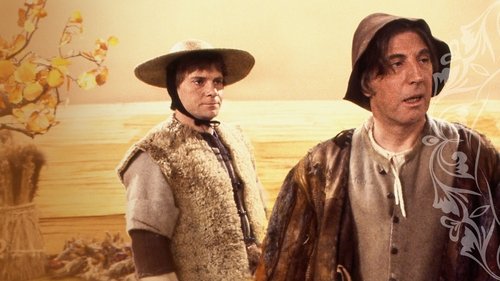Teodora
The Winter's Tale is a romance.Sets (one set )and costumes are very beautiful and fitting.Acting is very good,especially by Anna Calder Marshall as Hermione,Leontes'wrongly accused wife.A very beautiful The Winter's Tale.
mhk11
Though this production is not without some minor flaws, it is overall a sparkling version of a magnificent play. In particular, the director Jane Howell recognizes that the sumptuous language of the play is its foremost virtue, and she assigns top priority to the recitation of that language.The director is helped by superb acting from virtually every performer who appears. On the one hand, there are a few blemishes in the performance by Jeremy Kemp. For example, he rather awkwardly clutches his son while he is delivering the crucial "Affection" soliloquy, and he does not adequately convey a sense of desolation after the deaths of his son and wife have been announced to him in Act III. However, the few shortcomings in his performance are greatly surpassed by its overall excellence.Most of the other performances are flawless or nearly so. Margaret Tyzack is the very embodiment of speaking truth to power in her role as Paulina; David Burke (who is married to Anna Calder-Marshall, who impeccably plays Hermione) is convincing at every stage as Camillo; Cyril Luckham is a highly entertaining Antigonus; Robert Stephens is fine in the quite difficult role of Polixenes (difficult because Polixenes in much of the second half is as heavy-handedly oppressive as Leontes in the first half, albeit for different reasons); Paul Jesson and Arthur Hewlett are amusing as the rustic father and son; Rikki Fulton is an engaging Autolycus; and the sundry other members of the cast likewise carry out their roles admirably.The passage of sixteen years is not handled especially well, as only a few characters (Camillo, Hermione, Cleomines, Dion) look any older in the second half of the play than in the first half. The notorious difficulty of the exit of Antigonus pursued by a bear is likewise not handled particularly well, as the bear looks preposterously phony. (If that bit of the play were unequivocally comical, the phoniness of the bear would be unexceptionable. However, the pursuit of Antigonus is an event that leads to his gory death even though it also offers material for some entertaining remarks by Paul Jesson's character.) Still, the minor defects in this production detract only very slightly from its magic. I heartily recommend it to anyone who loves Shakespeare's awe-inspiring language and to anyone who admires fine acting.
Alain English
This excellent Shakespearean comedy is given a good production here with the BBC. Excellent performances combined with some great direction make this one of the more watchable of the BBC productions.King Leontes of Sicily (Jeremy Kemp) suspects his wife Hermione (Anna Calder-Marshall) of cheating on him with his friend King of Bohemia Polixenes (Robert Stephens) and sets in motion a tragic train of events leading to an improbable but welcome resolution...Jeremy Kemp is excellent as Leontes, and Margaret Tyzack is on fine form as Hermione's friend Paulina. Debbie Farrington plays Perdita, Leontes grown-up daughter and she is well matched with Robin Kermode who plays Floriziel. David Burke is solid as Camillo, and it's interesting to see Scottish actor Rikki Fulton as amiable rogue Autolycus.It's not all good - the bear special effect nearly produced laughter in me and the time span of the story is not played well at all - Camillo is the only who appears to age at all.Still, it's good fun and well-paced despite it's three hour running time.Good stuff.
tonstant viewer
"The Winter's Tale" is one of the late romances, in which an improbable plot is overcome by authorial magic. Unlikely people go through even more unlikely ordeals and separations, only to be united in healing reconciliation in the last scene. The test is, do you get the shivers down the back when fractured people are made whole again at the end? Here the answer is yes.Director Jane Howell uses a unit set which is unobtrusively effective all the way through. The visuals are in monochromatic white at first, then as the story progresses color is added in increasingly vivid tones. The actors often address themselves directly to the camera in tight closeup, so if you have a large-screen TV, you'll get to know these people real well.Pace is generally good, though we do bog down with the sheep-shearing festival of rustics at the beginning of the second half. Shakespeare's clowns are often annoying, but they can clear the air. I just don't like slowing down for them.Jeremy Kemp is excellent as the angry, paranoid King of the opening scenes. He glares into the camera lens and hisses his lines as the great screen villain he was. However, after the Oracle of Delphi pronounces his suspicions false and his wife innocent, Kemp never finds a way to physicalize his response and emotional transformation. You have to listen carefully to his well-recited lines, because you can't guess from his body what his reactions are.Robert Stephens as Polixenes looks blurry and very much the worse for wear, but gives a detailed and professional performance nonetheless. Margaret Tyzack is formidable as Pauline. It's scandalous that this is her only appearance in the series. Anna Calder-Marshall, Debbie Farrington and David Burke are all superior, and Jeremy Dimmick is probably the best young boy in the whole cycle.The rest of the cast is mostly fine, and many of them pop up again in Jane Howell's "Henry VI" trilogy plus "Richard III," and the "Titus Andronicus." This version of "The Winter's Tale" is good stuff, so don't hesitate.



